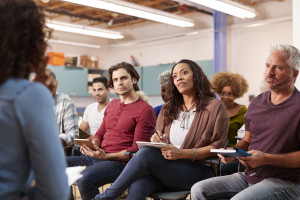Strengthening our communities through two-way communication
I n the fabric of our community, woven through the heart of the Utah Association of Special Districts, lies a fundamental truth that often goes under appreciated – the importance of not just speaking, but listening. Communication, in its most effective form, is a two-way street. It’s not merely about conveying our thoughts and messages outward but equally about inviting those external voices in, letting them echo through the corridors of our decision-making processes. This dialogue, this exchange of perspectives, is what fosters a sense of belonging, understanding, and ultimately, successful community outcomes.
n the fabric of our community, woven through the heart of the Utah Association of Special Districts, lies a fundamental truth that often goes under appreciated – the importance of not just speaking, but listening. Communication, in its most effective form, is a two-way street. It’s not merely about conveying our thoughts and messages outward but equally about inviting those external voices in, letting them echo through the corridors of our decision-making processes. This dialogue, this exchange of perspectives, is what fosters a sense of belonging, understanding, and ultimately, successful community outcomes.
Why Making Your Community Feel Heard Is Paramount
At its core, listening is an acknowledgement: “I see you, I hear you, and what you say matters.” It’s a sign of respect and a fundamental building block for trust. In the context of Special Districts, which serve specific community needs – be it water, transportation, or even emergency services – understanding those needs directly from the community’s vantage point is invaluable. It ensures that the services provided are not just effective but deeply resonant with those they’re meant to serve.
Active listening and feedback mechanisms enrich Special Districts with a multitude of perspectives, highlighting areas of strength and uncovering opportunities for improvement. They demonstrate a community-focused approach, where decisions are not made in isolation but are the product of collaborative input. Here’s why making your community feel heard isn’t just important, but essential:
Promotes Transparency and Accountability: When communities are engaged in dialogue and their feedback is sought, it nurtures an environment of transparency. It sends a clear message that the operations and decisions of a Special District are an open book, intended for the benefit of the community.
Enhances Service Delivery: By understanding the unique needs and desires of the community, Special Districts can tailor their services more precisely, leading to improved satisfaction and outcomes. It’s a way of aligning intentions with actual community needs.
Fosters Community Empowerment and Ownership: Active listening empowers community members, giving them a stake in the decisions and projects that shape their environment. This sense of ownership can lead to increased support for and participation in local initiatives.
Builds Stronger, More Connected Communities: At its heart, listening is about forming connections. It bridges gaps between the governing bodies and the community, creating a stronger, more unified populace ready to face challenges and seize opportunities together.
Creating Platforms for Dialogue and Feedback
Understanding the necessity of two-way communication begs the question: How can Special Districts foster this environment? Several strategies can be effective:
Community Meetings and Workshops: Regular, well-publicized meetings provide a forum for direct engagement. They’re opportunities for district representatives to listen, gather feedback, and share updates, facilitating a rich exchange of ideas.
Surveys and Polls: These tools can reach a wider audience, collecting valuable insights on community priorities and satisfaction levels. They can be easily distributed and analyzed, making them an efficient way to gauge public opinion.
Digital Platforms: Websites, social media, and email newsletters can all serve as two-way streets for communication. They offer channels for both disseminating information and collecting feedback, accessible to a broad segment of the community at any time.
In embracing the art of listening, we open doors to a more collaborative, informed, and cohesive community. It’s a commitment to not just govern, but to genuinely connect and understand, shaping a path forward that reflects the collective voice. At the Utah Association of Special Districts, we believe in the transformative power of two-way communication. By continually seeking to understand the feelings, thoughts, and needs of our community, we set the stage for personal and collective success. Together, we can achieve more, rooted in the shared mission of enhancing the lives of those we serve.






